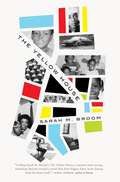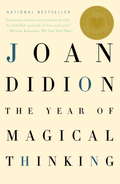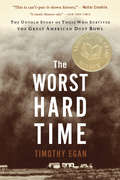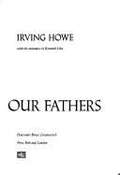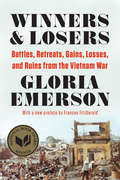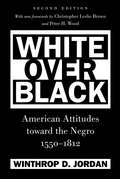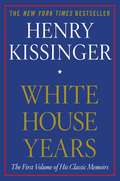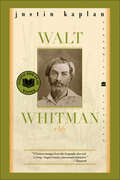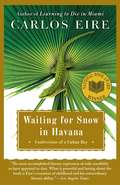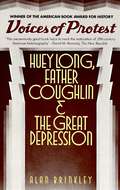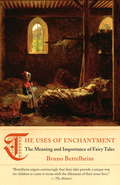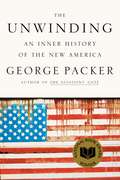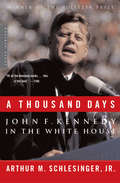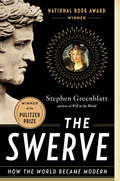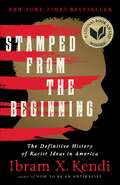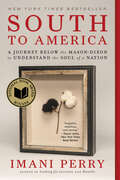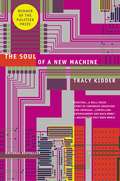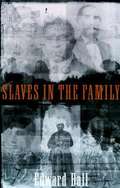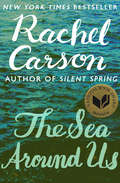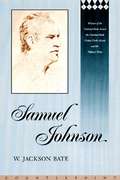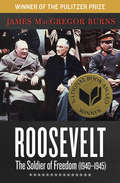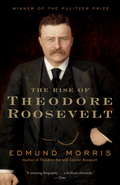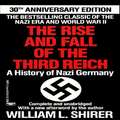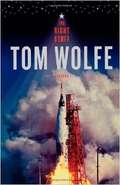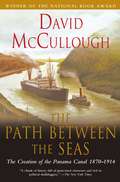Special Collections
National Book Award Winners - Non-Fiction
- Table View
- List View
The Yellow House
by Sarah BroomIn 1961, Sarah M. Broom's mother Ivory Mae bought a shotgun house in the then-promising neighborhood of New Orleans East and built her world inside of it. It was the height of the Space Race and the neighborhood was home to a major NASA plant--the postwar optimism seemed assured. Widowed, Ivory Mae remarried Sarah's father Simon Broom; their combined family would eventually number twelve children. But after Simon died, six months after Sarah's birth, the Yellow House would become Ivory Mae's thirteenth and most unruly child.
A book of great ambition, Sarah M. Broom's The Yellow House tells a hundred years of her family and their relationship to home in a neglected area of one of America's most mythologized cities. This is the story of a mother's struggle against a house's entropy, and that of a prodigal daughter who left home only to reckon with the pull that home exerts, even after the Yellow House was wiped off the map after Hurricane Katrina. The Yellow House expands the map of New Orleans to include the stories of its lesser known natives, guided deftly by one of its native daughters, to demonstrate how enduring drives of clan, pride, and familial love resist and defy erasure. Located in the gap between the "Big Easy" of tourist guides and the New Orleans in which Broom was raised, The Yellow House is a brilliant memoir of place, class, race, the seeping rot of inequality, and the internalized shame that often follows. It is a transformative, deeply moving story from an unparalleled new voice of startling clarity, authority, and power.
The Year of Magical Thinking
by Joan DidionJoan Didion explores an intensely personal yet universal experience: several days before Christmas 2003, John Gregory Dunne and Joan Didion saw their only daughter, Quintana, fall ill with what seemed at first flu, then pneumonia, then complete septic shock. She was put into an induced coma and placed on life support. Days later, the night before New Year's Eve, the Dunnes were just sitting down to dinner after visiting the hospital when John Gregory Dunne suffered a massive and fatal coronary. In a second, this close, symbiotic partnership of forty years was over. Four weeks later, their daughter pulled through. Two months after that, arriving at LAX, she collapsed and underwent six hours of brain surgery at UCLA Medical Center to relieve a massive hematoma.
This powerful book is Didion's attempt to make sense of the weeks and then months that cut loose any fixed idea she ever had about death, about illness, about marriage and children and memory, about the shallowness of sanity, about life itself.
Winner of the National Book Award
The Worst Hard Time
by Timothy EganThe author, Timothy Egan, tells a touching story of the individuals and families that survived the depression and the great American dust bowl during the 1930's through walking the land, diaries of survivors and talking with those individuals who lived through Black Sunday and still live in the high plains, which came to be known as the dust bowl. These stories focus around the towns of Dalhart and Boise in the Texas panhandle and how, when the soil of the plains took to the air, after millions of acres of prairie grass was plowed under and for months blew 20 plus days out of 30, with temperatures in the 120 degree range or dropped below zero while farmers huddled in dugouts in the ground, mothers watched their children die of dust pneumonia, they still held to the land. As the decade wore on, FDR's new deal programs attempted to assist the families of the high plains and struggled with the greatest ecological disaster of our country.
Winner of the National Book Award
World of Our Fathers
by Irving HoweThis book tells the story of those east European Jews who, for several decades starting in the 1880's, undertook a massive migration to the United States. There were two million of them, and they settled mostly in the large American cities, where they attempted to maintain their own Yiddish culture; then, as a result of both external pressures and their own desires, they made their way into American society.
Winner of the National Book Award
Winners & Losers
by Frances Fitzgerald and Gloria EmersonThe National Book Award-winning classic on the Vietnam War, reissued for the war's fiftieth anniversary. Based on interviews with both Americans and Vietnamese, Winners and Losers is Gloria Emerson's powerful portrait of the Vietnam War. From soldiers on the battlefield to protesters on the home front, Emerson chronicles the war's impact on ordinary lives with characteristic insight and brilliance. Today, as we approach the fiftieth anniversary of the Gulf of Tonkin incident, much of the physical and emotional damage from that conflict--the empty political rhetoric, the mounting casualties, and the troubled homecomings of shell-shocked soldiers--is once again part of the American experience. Winners and Losers remains a potent reminder of the danger of blindly applied American power, and its poignant truths are the legacy of a remarkable journalist.
White Over Black
by Winthrop D. Jordan and Christopher Leslie Brown and Peter H. WoodIn 1968, Winthrop D. Jordan set out in encyclopedic detail the evolution of white Englishmen's and Anglo-Americans' perceptions of blacks, perceptions of difference used to justify race-based slavery, and liberty and justice for whites only. This second edition, with new forewords by historians Christopher Leslie Brown and Peter H. Wood, reminds us that Jordan's text is still the definitive work on the history of race in America in the colonial era. Every book published to this day on slavery and racism builds upon his work; all are judged in comparison to it; none has surpassed it.
National Book Award Winner
White House Years
by Henry KissingerOne of the most important books to come out of the Nixon Administration, the New York Times bestselling White House Years covers Henry Kissinger&’s first four years (1969–1973) as Assistant to the President for National Security Affairs.Among the momentous events recounted in this first volume of Kissinger’s timeless memoirs are his secret negotiations with the North Vietnamese in Paris to end the Vietnam War, the Jordan crisis of 1970, the India-Pakistan war of 1971, his back-channel and face-to-face negotiations with Soviet leaders to limit the nuclear arms race, his secret journey to China, and the historic summit meetings in Moscow and Beijing in 1972. He covers major controversies of the period, including events in Laos and Cambodia, his “peace is at hand” press conference and the breakdown of talks with the North Vietnamese that led to the Christmas bombing in 1972. Throughout, Kissinger presents candid portraits of world leaders, including Richard Nixon, Anwar Sadat, Golda Meir, Jordan’s King Hussein, Leonid Brezhnev, Chairman Mao and Chou En-lai, Willy Brandt, Charles de Gaulle, and many others. White House Years is Henry Kissinger’s invaluable and lasting contribution to the history of this crucial time.
Walt Whitman
by Justin KaplanThe Pulitzer Prize and National Book Award-winning author “gives us flesh and blood Whitman in this fine and sensitive biography” (The Boston Globe).A moving, penetrating, sharply focused portrait of America’s greatest poet—his genius, his passions, his androgynous sensibility—an exuberant life entwined with the turbulent history of mid-nineteenth century America. In vivid detail, Justin Kaplan, winner of the Pulitzer Prize and the National Book Award, examines the mysterious selves of this enigmatic man whose bold voice of joy and sexual liberation embraced a growing nation . . . and exposes the quintessential Whitman, that perfect poet whose astonishing verse made “words sing, dance, kiss, copulate” for an entire world to hear.“Whitman emerges from this biography alive and kicking—hugely human, enormously attractive.” —Newsweek“Not only readable, but dramatic.” —The New York Times Book Review“A buoyant, energizing book.” —The Nation“Brilliant.” —Publishers Weekly
Waiting for Snow in Havana
by Carlos Eire"Have mercy on me, Lord, I am Cuban." In 1962, Carlos Eire was one of 14,000 children airlifted out of Havana--exiled from his family, his country, and his own childhood by Fidel Castro's revolution. Winner of the National Book Award, this stunning memoir is a vibrant and evocative look at Latin America from a child's unforgettable experience.Waiting for Snow in Havana is both an exorcism and an ode to a paradise lost. For the Cuba of Carlos's youth--with its lizards and turquoise seas and sun-drenched siestas--becomes an island of condemnation once a cigar-smoking guerrilla named Fidel Castro ousts President Batista on January 1, 1959. Suddenly the music in the streets sounds like gunfire. Christmas is made illegal, political dissent leads to imprisonment, and too many of Carlos's friends are leaving Cuba for a place as far away and unthinkable as the United States. Carlos will end up there, too, and fulfill his mother's dreams by becoming a modern American man--even if his soul remains in the country he left behind. Narrated with the urgency of a confession, Waiting for Snow in Havana is a eulogy for a native land and a loving testament to the collective spirit of Cubans everywhere. lost. More than that, it captures the terrible beauty of those times in our lives when we are certain we have died -- and then are somehow, miraculously, reborn.
Voices of Protest
by Alan BrinkleyThis is a book about two remarkable men--Huey P. Long, a first-term United States Senator from the red-clay, piney-woods country of northern Louisiana; and Charles E. Coughlin, a Catholic priest from an industrial suburb near Detroit. From modest origins, they rose together in the early years of the Great Depression to become the two most successful leaders of national political dissidence of their era.
Winner of the National Book Award
The Uses of Enchantment
by Bruno BettelheimBruno Bettelheim was one of the great child psychologists of the twentieth century and perhaps none of his books has been more influential than this revelatory study of fairy tales and their universal importance in understanding childhood development.
Analyzing a wide range of traditional stories, from the tales of Sindbad to “The Three Little Pigs,” “Hansel and Gretel,” and “The Sleeping Beauty,” Bettelheim shows how the fantastical, sometimes cruel, but always deeply significant narrative strands of the classic fairy tales can aid in our greatest human task, that of finding meaning for one’s life.
Winner of the National Book Award
The Unwinding
by George PackerA riveting examination of a nation in crisis, from one of the finest political journalists of our generation.
American democracy is beset by a sense of crisis. Seismic shifts during a single generation have created a country of winners and losers, allowing unprecedented freedom while rending the social contract, driving the political system to the verge of breakdown, and setting citizens adrift to find new paths forward. In The Unwinding, George Packer, author of The Assassins' Gate: America in Iraq, tells the story of the United States over the past three decades in an utterly original way, with his characteristically sharp eye for detail and gift for weaving together complex narratives.
The Unwinding journeys through the lives of several Americans, including Dean Price, the son of tobacco farmers, who becomes an evangelist for a new economy in the rural South; Tammy Thomas, a factory worker in the Rust Belt trying to survive the collapse of her city; Jeff Connaughton, a Washington insider oscillating between political idealism and the lure of organized money; and Peter Thiel, a Silicon Valley billionaire who questions the Internet's significance and arrives at a radical vision of the future. Packer interweaves these intimate stories with biographical sketches of the era's leading public figures, from Newt Gingrich to Jay-Z, and collages made from newspaper headlines, advertising slogans, and song lyrics that capture the flow of events and their undercurrents.
The Unwinding portrays a superpower in danger of coming apart at the seams, its elites no longer elite, its institutions no longer working, its ordinary people left to improvise their own schemes for success and salvation. Packer's novelistic and kaleidoscopic history of the new America is his most ambitious work to date.
National Book Award 2013
A Thousand Days
by Arthur M. Schlesinger Jr.Pulitzer Prize and National Book Award winner: &“Of all the Kennedy books . . . this is the best.&” —Time Arthur M. Schlesinger Jr. served as special assistant to President John F. Kennedy throughout his presidency—from the long and grueling campaign to Kennedy&’s tragic and unexpected assassination by Lee Harvey Oswald. In A Thousand Days, Schlesinger combines intimate knowledge as one of President Kennedy&’s inner circle with sweeping research and historic context to provide a look at one of the most legendary presidential administrations in American history. From JFK&’s battle with Nixon during the 1960 election, to the seemingly charmed inaugural days, to international conflict and domestic unrest, Schlesinger takes a close and fond, but unsparing, look at Kennedy&’s tenure in the White House, covering well-known successes, like his involvement in the Civil Rights movement; infamous humiliations, like the Bay of Pigs; and often overlooked struggles, like the Skybolt missile mix-up, alike. Praised by the New York Times as &“at once a masterly literary achievement and a work of major historical significance,&” A Thousand Days is not only a fascinating look at an American president, but a towering achievement in historical documentation.
The Swerve
by Stephen GreenblattWinner of the Pulitzer Prize for Nonfiction • Winner of the National Book Award • New York Times Bestseller Renowned scholar Stephen Greenblatt brings the past to vivid life in what is at once a supreme work of scholarship, a literary page-turner, and a thrilling testament to the power of the written word. In the winter of 1417, a short, genial, cannily alert man in his late thirties plucked a very old manuscript off a dusty shelf in a remote monastery, saw with excitement what he had discovered, and ordered that it be copied. He was Poggio Bracciolini, the greatest book hunter of the Renaissance. His discovery, Lucretius’ ancient poem On the Nature of Things, had been almost entirely lost to history for more than a thousand years. It was a beautiful poem of the most dangerous ideas: that the universe functions without the aid of gods, that religious fear is damaging to human life, that pleasure and virtue are not opposites but intertwined, and that matter is made up of very small material particles in eternal motion, randomly colliding and swerving in new directions. Its return to circulation changed the course of history. The poem’s vision would shape the thought of Galileo and Freud, Darwin and Einstein, and—in the hands of Thomas Jefferson—leave its trace on the Declaration of Independence. From the gardens of the ancient philosophers to the dark chambers of monastic scriptoria during the Middle Ages to the cynical, competitive court of a corrupt and dangerous pope, Greenblatt brings Poggio’s search and discovery to life in a way that deepens our understanding of the world we live in now. “An intellectually invigorating, nonfiction version of a Dan Brown–like mystery-in-the-archives thriller.” —Boston Globe
Stamped From the Beginning
by Ibram X. KendiSome Americans cling desperately to the myth that we are living in a post-racial society, that the election of the first Black president spelled the doom of racism. In fact, racist thought is alive and well in America--more sophisticated and more insidious than ever. And as award-winning historian Ibram X. Kendi argues in Stamped from the Beginning, if we have any hope of grappling with this stark reality, we must first understand how racist ideas were developed, disseminated, and enshrined in American society.
In this deeply researched and fast-moving narrative, Kendi chronicles the entire story of anti-Black racist ideas and their staggering power over the course of American history. Stamped from the Beginning uses the life stories of five major American intellectuals to offer a window into the contentious debates between assimilationists and segregationists and between racists and anti racists. From Puritan minister Cotton Mather to Thomas Jefferson, from fiery abolitionist William Lloyd Garrison to brilliant scholar W.E.B. Du Bois to legendary anti-prison activist Angela Davis, Kendi shows how and why some of our leading proslavery and pro-civil rights thinkers have challenged or helped cement racist ideas in America.
Contrary to popular conceptions, racist ideas did not arise from ignorance or hatred. Instead, they were devised and honed by some of the most brilliant minds of each era. These intellectuals used their brilliance to justify and rationalize deeply entrenched discriminatory policies and the nation's racial disparities in everything from wealth to health. And while racist ideas are easily produced and easily consumed, they can also be discredited. In shedding much-needed light on the murky history of racist ideas, Stamped from the Beginning offers us the tools we need to expose them--and in the process, gives us reason to hope.
Winner of the National Book Award
A New York Times Bestseller
South to America
by Imani PerryA Most Anticipated Book From: The New York Times • TIME • Oprah Daily • Vulture • Essence • Esquire • W Magazine • Atlanta Journal-Constitution • PopSugar • Book Riot • Chicago Review of Books • Electric Literature • Lit Hub.
An essential, surprising journey through the history, rituals, and landscapes of the American South—and a revelatory argument for why you must understand the South in order to understand America.
We all think we know the South. Even those who have never lived there can rattle off a list of signifiers: the Civil War, Gone with the Wind, the Ku Klux Klan, plantations, football, Jim Crow, slavery. But the idiosyncrasies, dispositions, and habits of the region are stranger and more complex than much of the country tends to acknowledge. In South to America, Imani Perry shows that the meaning of American is inextricably linked with the South, and that our understanding of its history and culture is the key to understanding the nation as a whole.
This is the story of a Black woman and native Alabaman returning to the region she has always called home and considering it with fresh eyes. Her journey is full of detours, deep dives, and surprising encounters with places and people. She renders Southerners from all walks of life with sensitivity and honesty, sharing her thoughts about a troubling history and the ritual humiliations and joys that characterize so much of Southern life.
Weaving together stories of immigrant communities, contemporary artists, exploitative opportunists, enslaved peoples, unsung heroes, her own ancestors, and her lived experiences, Imani Perry crafts a tapestry unlike any other. With uncommon insight and breathtaking clarity, South to America offers an assertion that if we want to build a more humane future for the United States, we must center our concern below the Mason-Dixon Line.
The Soul of a New Machine
by Tracy KidderComputers have changed since 1981, when Tracy Kidder memorably recorded the drama, comedy, and excitement of one company's efforts to bring a new microcomputer to market. What has not changed is the feverish pace of the high-tech industry, the go-for-broke approach to business that has caused so many computer companies to win big (or go belly up), and the cult of pursuing mind-bending technological innovations. The Soul of a New Machine is an essential chapter in the history of the machine that revolutionized the world in the twentieth century.
Winner of the National Book Award
Slaves in the Family
by Edward BallThe Ball family hails from South Carolina―Charleston and thereabouts. Their plantations were among the oldest and longest-standing plantations in the South. Between 1698 and 1865, close to four thousand black people were born into slavery under the Balls or were bought by them. In Slaves in the Family, Edward Ball recounts his efforts to track down and meet the descendants of his family's slaves. Part historical narrative, part oral history, part personal story of investigation and catharsis, Slaves in the Family is, in the words of Pat Conroy, "a work of breathtaking generosity and courage, a magnificent study of the complexity and strangeness and beauty of the word ‘family.'"
Winner of the National Book Award
The Sea Around Us
by Rachel CarsonNational Book Award Winner and New York Times Bestseller: Explore earth&’s most precious, mysterious resource—the ocean—with the author of Silent Spring. With more than one million copies sold, Rachel Carson&’s The Sea Around Us became a cultural phenomenon when first published in 1951 and cemented Carson&’s status as the preeminent natural history writer of her time. Her inspiring, intimate writing plumbs the depths of an enigmatic world—a place of hidden lands, islands newly risen from the earth&’s crust, fish that pour through the water, and the unyielding, epic battle for survival. Firmly based in the scientific discoveries of the time, The Sea Around Us masterfully presents Carson&’s commitment to a healthy planet and a fully realized sense of wonder. This ebook features an illustrated biography of Rachel Carson including rare photos and never-before-seen documents from the Beinecke Rare Book and Manuscript Library at Yale University.
Samuel Johnson
by Walter Jackson BateW. Jackson Bate's Samuel Johnson has been hailed as a supreme example of the biographer's art and the first great modern life of Johnson. Bate's work is literary biography at its finest, delving into the character that formed Johnson's awesome intellect and fueled his prodigious output.
Winner of the Pulitzer Prize
Winner of the National Book Award
Roosevelt
by James MacGregor BurnsThe &“engrossing&” Pulitzer Prize and National Book Award–winning history of FDR&’s final years (Barbara Tuchman). The second entry in James Macgregor Burns&’s definitive two-volume biography of Franklin Delano Roosevelt begins with the president&’s precedent-breaking third term election in 1940, just as Americans were beginning to face the likelihood of war. Here, Burns examines Roosevelt&’s skillful wartime leadership as well as his vision for post-war peace. Hailed by William Shirer as &“the definitive book on Roosevelt in the war years,&” and by bestselling author Barbara Tuchman as &“engrossing, informative, endlessly readable,&” The Soldier of Freedom is a moving profile of a leader gifted with rare political talent in an era of extraordinary challenges, sacrifices, heroism, and hardship.
The Rise of Theodore Roosevelt
by Edmund MorrisThis is Morris's highly acclaimed account of Theodore Roosevelt's life, encompassing the years from Roosevelt's birth to his service in the White House. He was one of our most vibrant presidents; his image still haunts our past and our present. This fascinating and comprehensive biography of the extraordinary naturalist, adventurer, soldier, and politician, tells the improbable, but very real, story of a man determined to get what he wanted, an American who helped define our century and our very character.
Winner of the Publitzer Prize
Winner of the National Book Award
The Rise and Fall of the Third Reich
by William L. ShirerBefore the Nazies could destroy the files, famed foreign correspondent and historian William L. Shirer sifted through the massive self-documentation of the Third Reich, to create a monumental study that has been widely acclaimed as the definitive record of one of the most frightening chapters in the history of mankind--now in a special 30th anniversary edition.
Winner of the National Book Award
The Right Stuff
by Tom WolfeThe Right Stuff is Tom Wolfe's deft account of a cast of heroes, introduced to America with the explosion of space exploration in the romantic heyday of the 20th century and encapsulated in Neal Armstrong's "one giant step for mankind."
Beginning with the first experiments with manned space flight in the 1940s, remembering the feats of Chuck Yeager and the breaking of the sound barrier, and focusing in on the brave pilots of the Mercury Project, Wolfe's ability to marry historical fact with dramatic intensity is nowhere more evident than in The Right Stuff.
Winner of the National Book Award
The Path Between the Seas
by David McCulloughThe National Book Award–winning epic chronicle of the creation of the Panama Canal, a first-rate drama of the bold and brilliant engineering feat that was filled with both tragedy and triumph, told by master historian David McCullough.From the Pulitzer Prize–winning author of Truman, here is the national bestselling epic chronicle of the creation of the Panama Canal. In The Path Between the Seas, acclaimed historian David McCullough delivers a first-rate drama of the sweeping human undertaking that led to the creation of this grand enterprise. The Path Between the Seas tells the story of the men and women who fought against all odds to fulfill the 400-year-old dream of constructing an aquatic passageway between the Atlantic and Pacific oceans. It is a story of astonishing engineering feats, tremendous medical accomplishments, political power plays, heroic successes, and tragic failures. Applying his remarkable gift for writing lucid, lively exposition, McCullough weaves the many strands of the momentous event into a comprehensive and captivating tale. Winner of the National Book Award for history, the Francis Parkman Prize, the Samuel Eliot Morison Award, and the Cornelius Ryan Award (for the best book of the year on international affairs), The Path Between the Seas is a must-read for anyone interested in American history, the history of technology, international intrigue, and human drama.
